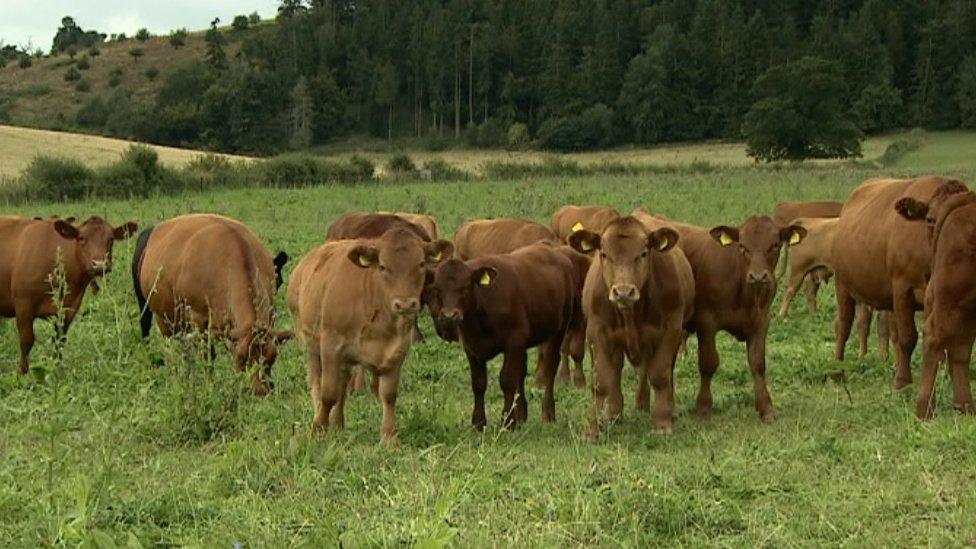Eat less meat to save the planet from climate change?
- Published

James Evansā herd of organic beef cattle
Eat less meat and save the planet. It's an idea that's been floating around for a while and now seems to have reached peak newsworthiness in response to the latest expert report on climate change. But perhaps not surprisingly farmers really don't agree with this idea at all.
The latest Intergovernmental Panel on Climate Change (IPCC) report is called and it burst into the news cycle earlier this month. The IPCC presents a complex and nuanced discussion about many aspects of land use but most news organisations boiled all that down to " and ".
erupted in furious anger asking why once again they were being blamed for the problems of climate change?
Shropshire beef
So I went off to see James Evans, he's a beef farmer on the Shropshire-Wales border and he's a very interesting person to talk to about all this. James has recently converted his entire beef enterprise to organic status. Something he did at the request of the new owners of the estate and which he wasn't too happy about to begin with.
The cattle enjoy longer grasses mixed with other plants
James was worried a switch to organic production would severely hit the bottom line of his business. But several years into the process and he says the animals are happier and profits are up. On top of that he says this new approach is better for the environment. So what's changed?
The beef cattle are now kept on paddocks of long grass containing a mix of plants. They are moved every few days and eventually return to the paddock where they started when the grass has had enough time to re-grow and be ready for grazing again.
Lock in carbon
That longer grass locks in more carbon and tractor use is also down as James no longer cuts hay for feeding to the cattle in the winter. To go back to the IPCC report for a moment this is exactly the sort of improvement they say can help with climate change. Better productivity in livestock farming has a big role to play here.
Because as any farmer will tell you (and in the last week I've heard this argument a LOT!) a diet rich in avocados and rice is much more problematic in terms of its impact on the planet and on our climate than one which includes a steak from James Evans' cattle.
The organic cattle are better for the bottom line
Indeed, the IPCC report points the finger at livestock production in the far east and also rice farming as particular issues for the climate in terms of emissions. Meanwhile, British beef farmers look at the poor productivity of Brazilian cattle as another source of problems.
Sausage roll
And for the rest of us it's just much more seductive to think we can do our part to save the planet by choosing a veggie burger once a week rather than decide to skip that long haul holiday or getting rid of the family car.
British farmers say they are not a climate change problem. They are part of the . We should at least hear out their arguments before condemning them. As the full IPCC report suggests, it's all a bit more complicated than trying a vegan sausage roll now and then.